5 Best Tips For Keeping Pool Water Clear During Rainy Seasons
Rainy seasons bring relief from hot weather, but they also present a unique challenge for pool owners — keeping the water clear and balanced. Increased rainfall can introduce more organic debris and dilute the pool's chemical levels, making it harder to maintain the ideal conditions. Understanding how to manage your pool during these wetter months is essential to maintaining a sparkling oasis that is safe and inviting. Regular monitoring of chemical levels, prompt removal of leaves and other debris, and adjusting your pool's filtration system are all crucial steps in ensuring your pool remains a pristine retreat despite the increased rainfall.
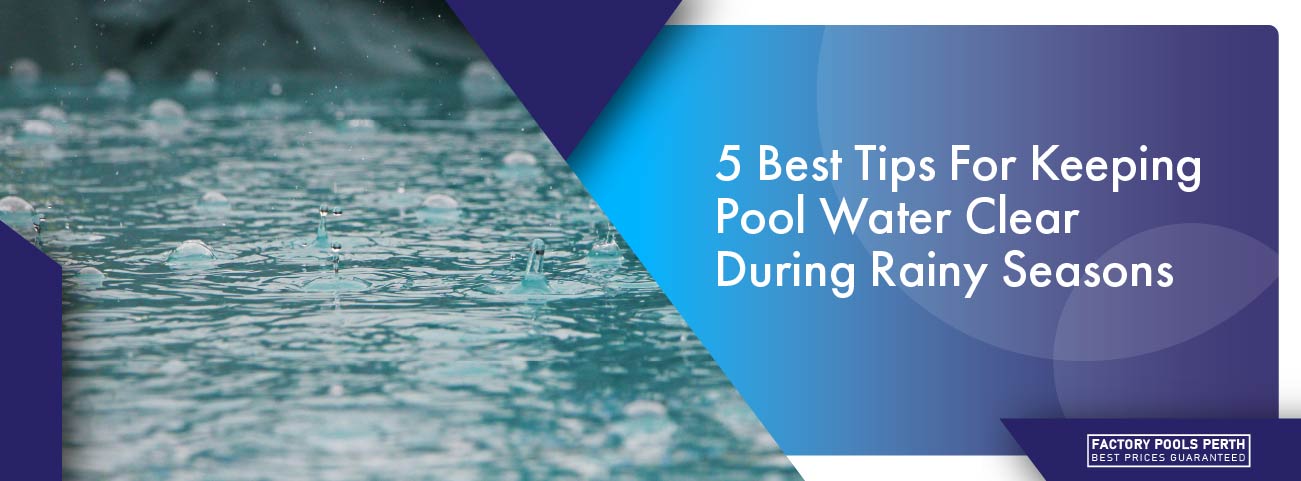
Understanding the Impact of Rain on Pool Water
Rainwater can significantly affect pool chemistry. When it rains, water introduces various contaminants, such as debris, dirt, and organic matter, into the pool, which can disrupt the water’s purity. Additionally, rainwater dilutes the existing chemical balance, which is meticulously maintained to ensure a safe swimming environment. This imbalance can lead to several issues like algae growth, which turns the water green and slippery, and cloudy water, which obscures visibility and is unappealing. Most rainwater is slightly acidic due to atmospheric pollutants, which can lower your pool’s pH balance, making the water corrosive.
This corrosion can damage pool surfaces and equipment, and the acidic water can be uncomfortable for swimmers, causing eye and skin irritation. But worry not! With the right knowledge and tools, such as regular water testing and appropriate chemical adjustments, you can keep your pool pristine and inviting even when the clouds roll in. Regular maintenance and the use of pool covers during rainstorms can also help in minimising these effects.
The 5 Best Tips for Clear Pool Water in Rainy Seasons
Regularly Clean and Maintain Pool Filters
Your pool’s filter system is the first line of defence against impurities and contaminants that can affect water quality. Ensure it’s running efficiently by cleaning or replacing filter cartridges as needed, backwashing sand filters to remove trapped particles, or regenerating diatomaceous earth filters to restore their filtering capacity. Regular maintenance helps the filter catch debris brought in by the rain, such as leaves, dirt, and other organic material, preventing cloudy water and maintaining a safe and enjoyable swimming environment. Regularly checking and maintaining your filter system also extends its lifespan, saving you from costly repairs and ensuring optimal performance.
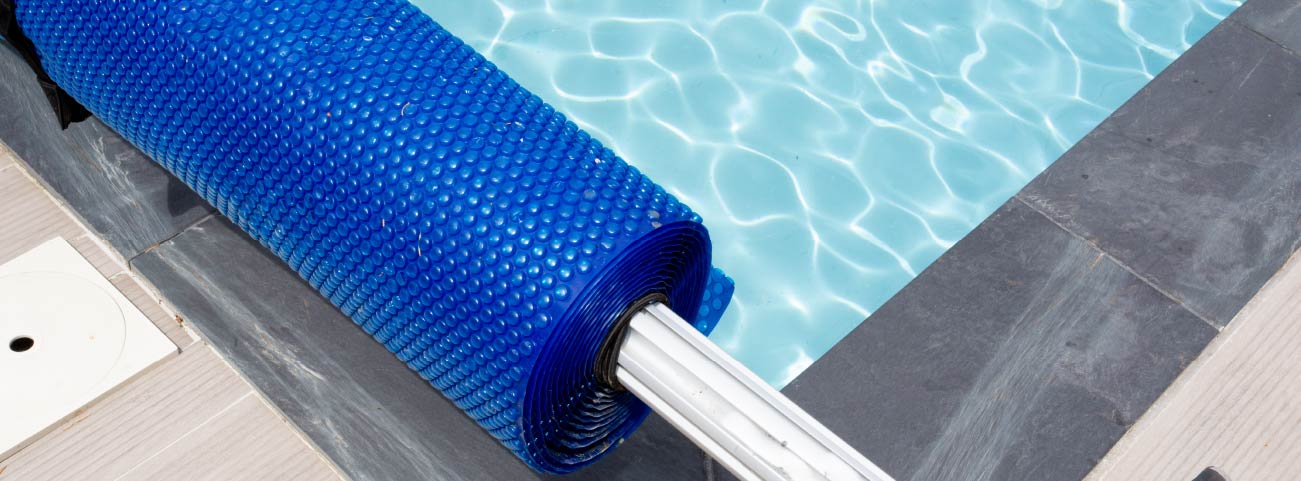
Monitor and Adjust Chemical Levels After Heavy Rain
Rain can wash in contaminants and drastically change your pool’s chemistry, introducing everything from dirt and debris to various chemicals. These changes can affect the balance of essential elements in your pool. Test the water after every heavy downpour and adjust the chlorine, pH, alkalinity, and stabiliser levels accordingly. This helps to neutralise any unwanted substances and restore balance. Keeping a close eye on these parameters is crucial for preventing algae growth, maintaining water clarity, and ensuring a safe and enjoyable swimming environment for everyone. Regular maintenance and monitoring can save you from more significant problems down the line.
Use a Pool Cover Strategically
A high-quality pool cover can be a pool owner’s best friend, especially during the rainy season. Not only does it keep out leaves, twigs, and other debris, but it can also significantly reduce the amount of rainwater that mixes with your pool water, helping to maintain its chemical balance. Additionally, using a cover can minimise evaporation and reduce the need for frequent cleaning. Always use the cover whenever you expect heavy rain or when the pool is not in use for extended periods, ensuring your pool remains clean and well-maintained.
Properly Manage Pool Water Levels
Excessive rainfall can cause pool water levels to rise too much, leading to potential skimmer issues and inefficient filtration. When water levels get too high, the skimmer may not function properly, reducing its ability to capture debris and clean the pool effectively. To avoid this, monitor your water levels closely during the rainy season, especially after heavy downpours. Make sure to drain excess water as needed to maintain the proper balance. For optimal results, keep the water level at the centre level of your pool skimmer, which ensures that your filtration system operates efficiently and keeps your pool clean and safe for swimming. Regular maintenance checks and preemptive adjustments can save you from bigger issues down the line.
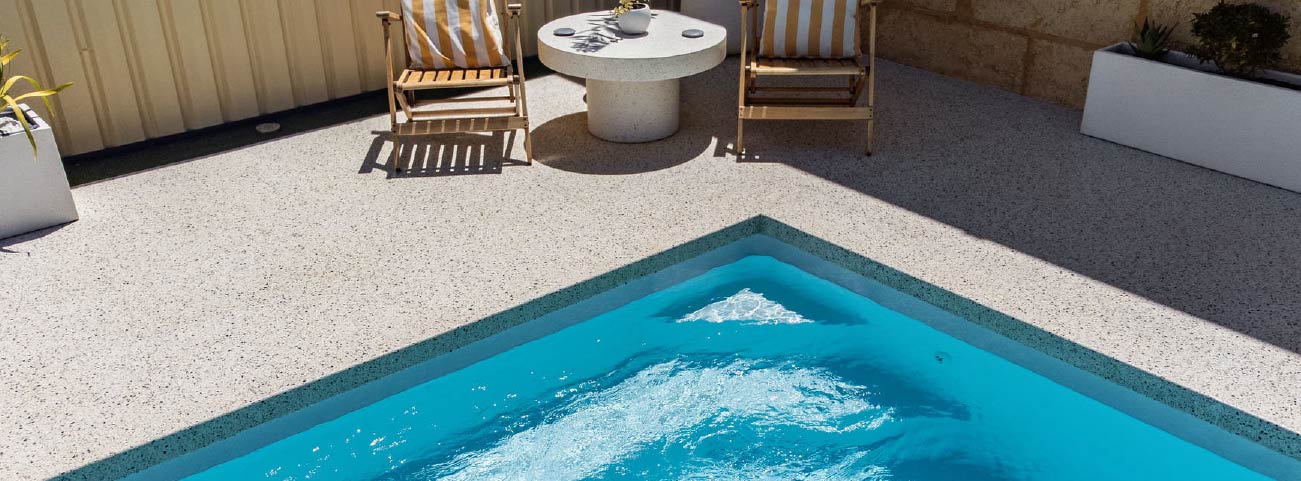
Implement Regular Skimming and Vacuuming
Combat the extra load of airborne debris brought on by storms by skimming the surface of your pool often. This helps to remove leaves, twigs, and other floating particles that can accumulate quickly. Regular vacuuming is also vital to remove sediment and dirt that settle at the bottom before it breaks down and affects water clarity. In addition to skimming and vacuuming, consider brushing the pool walls to prevent algae buildup. These simple steps can greatly enhance your filter’s performance, reduce the strain on your pool equipment, and keep your pool inviting and enjoyable for swimmers.
Additional Considerations for Homeowners
Beyond your pool maintenance routine, consider incorporating landscaping and drainage solutions that direct rainwater away from your pool area. Strategic placement of shrubs, grading the land to slope away from the pool, and implementing effective drainage systems can significantly mitigate runoff water’s impact on your pool’s chemical balance. Additionally, using mulch and ground cover plants can help absorb excess water, while installing French drains or catch basins can further enhance water management. These measures not only protect your pool but also enhance the overall aesthetic and functionality of your outdoor space.
Rain doesn’t have to dampen your enjoyment of a crystal-clear pool. With proactivity and the right care, you can enjoy your aquatic haven regardless of the weather. Remember to clean filters regularly, as they can quickly become clogged with debris brought in by the rain. Balance chemicals after precipitation to ensure the water remains safe and comfortable for swimming. Use a pool cover wisely to protect the pool from excessive debris and maintain appropriate water levels by draining excess water if necessary. Keep up with skimming and vacuuming to remove any dirt or leaves that find their way into your pool. Happy swimming, rain or shine!
5 Best Tips For Keeping Pool Water Clear During Rainy Seasons
Rainy seasons bring relief from hot weather, but they also present a unique challenge for pool owners — keeping the water clear and balanced. Increased rainfall can introduce more organic debris and dilute the pool's chemical levels, making it harder to maintain the ideal conditions. Understanding how to manage your pool during these wetter months is essential to maintaining a sparkling oasis that is safe and inviting. Regular monitoring of chemical levels, prompt removal of leaves and other debris, and adjusting your pool's filtration system are all crucial steps in ensuring your pool remains a pristine retreat despite the increased rainfall.
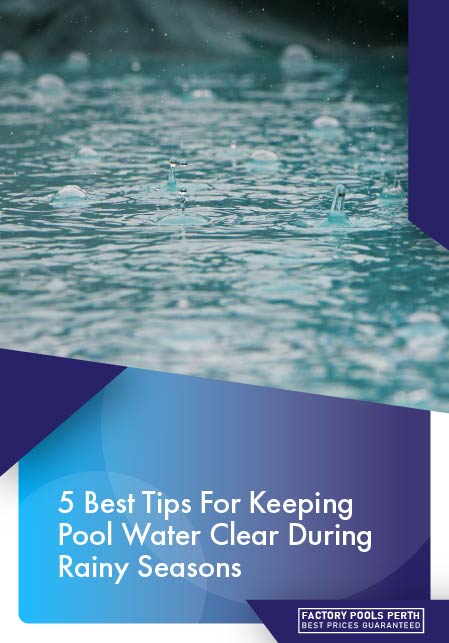
Understanding the Impact of Rain on Pool Water
Rainwater can significantly affect pool chemistry. When it rains, water introduces various contaminants, such as debris, dirt, and organic matter, into the pool, which can disrupt the water’s purity. Additionally, rainwater dilutes the existing chemical balance, which is meticulously maintained to ensure a safe swimming environment. This imbalance can lead to several issues like algae growth, which turns the water green and slippery, and cloudy water, which obscures visibility and is unappealing. Most rainwater is slightly acidic due to atmospheric pollutants, which can lower your pool’s pH balance, making the water corrosive.
This corrosion can damage pool surfaces and equipment, and the acidic water can be uncomfortable for swimmers, causing eye and skin irritation. But worry not! With the right knowledge and tools, such as regular water testing and appropriate chemical adjustments, you can keep your pool pristine and inviting even when the clouds roll in. Regular maintenance and the use of pool covers during rainstorms can also help in minimising these effects.
The 5 Best Tips for Clear Pool Water in Rainy Seasons
Regularly Clean and Maintain Pool Filters
Your pool’s filter system is the first line of defence against impurities and contaminants that can affect water quality. Ensure it’s running efficiently by cleaning or replacing filter cartridges as needed, backwashing sand filters to remove trapped particles, or regenerating diatomaceous earth filters to restore their filtering capacity. Regular maintenance helps the filter catch debris brought in by the rain, such as leaves, dirt, and other organic material, preventing cloudy water and maintaining a safe and enjoyable swimming environment. Regularly checking and maintaining your filter system also extends its lifespan, saving you from costly repairs and ensuring optimal performance.
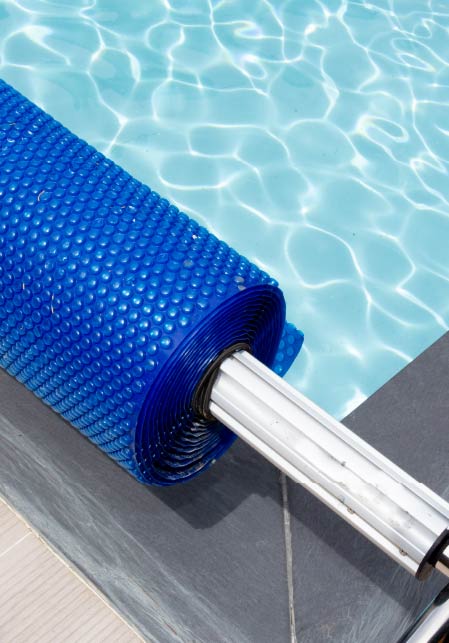
Monitor and Adjust Chemical Levels After Heavy Rain
Rain can wash in contaminants and drastically change your pool’s chemistry, introducing everything from dirt and debris to various chemicals. These changes can affect the balance of essential elements in your pool. Test the water after every heavy downpour and adjust the chlorine, pH, alkalinity, and stabiliser levels accordingly. This helps to neutralise any unwanted substances and restore balance. Keeping a close eye on these parameters is crucial for preventing algae growth, maintaining water clarity, and ensuring a safe and enjoyable swimming environment for everyone. Regular maintenance and monitoring can save you from more significant problems down the line.
Use a Pool Cover Strategically
A high-quality pool cover can be a pool owner’s best friend, especially during the rainy season. Not only does it keep out leaves, twigs, and other debris, but it can also significantly reduce the amount of rainwater that mixes with your pool water, helping to maintain its chemical balance. Additionally, using a cover can minimise evaporation and reduce the need for frequent cleaning. Always use the cover whenever you expect heavy rain or when the pool is not in use for extended periods, ensuring your pool remains clean and well-maintained.
Properly Manage Pool Water Levels
Excessive rainfall can cause pool water levels to rise too much, leading to potential skimmer issues and inefficient filtration. When water levels get too high, the skimmer may not function properly, reducing its ability to capture debris and clean the pool effectively. To avoid this, monitor your water levels closely during the rainy season, especially after heavy downpours. Make sure to drain excess water as needed to maintain the proper balance. For optimal results, keep the water level at the centre level of your pool skimmer, which ensures that your filtration system operates efficiently and keeps your pool clean and safe for swimming. Regular maintenance checks and preemptive adjustments can save you from bigger issues down the line.
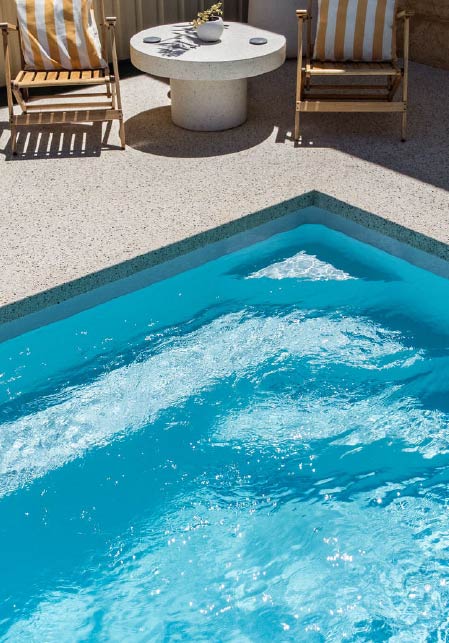
Implement Regular Skimming and Vacuuming
Combat the extra load of airborne debris brought on by storms by skimming the surface of your pool often. This helps to remove leaves, twigs, and other floating particles that can accumulate quickly. Regular vacuuming is also vital to remove sediment and dirt that settle at the bottom before it breaks down and affects water clarity. In addition to skimming and vacuuming, consider brushing the pool walls to prevent algae buildup. These simple steps can greatly enhance your filter’s performance, reduce the strain on your pool equipment, and keep your pool inviting and enjoyable for swimmers.
Additional Considerations for Homeowners
Beyond your pool maintenance routine, consider incorporating landscaping and drainage solutions that direct rainwater away from your pool area. Strategic placement of shrubs, grading the land to slope away from the pool, and implementing effective drainage systems can significantly mitigate runoff water’s impact on your pool’s chemical balance. Additionally, using mulch and ground cover plants can help absorb excess water, while installing French drains or catch basins can further enhance water management. These measures not only protect your pool but also enhance the overall aesthetic and functionality of your outdoor space.
Rain doesn’t have to dampen your enjoyment of a crystal-clear pool. With proactivity and the right care, you can enjoy your aquatic haven regardless of the weather. Remember to clean filters regularly, as they can quickly become clogged with debris brought in by the rain. Balance chemicals after precipitation to ensure the water remains safe and comfortable for swimming. Use a pool cover wisely to protect the pool from excessive debris and maintain appropriate water levels by draining excess water if necessary. Keep up with skimming and vacuuming to remove any dirt or leaves that find their way into your pool. Happy swimming, rain or shine!



